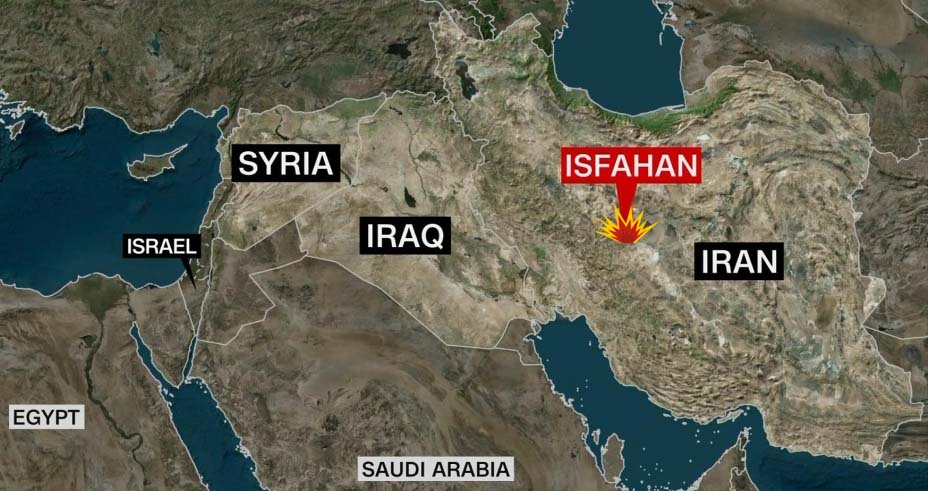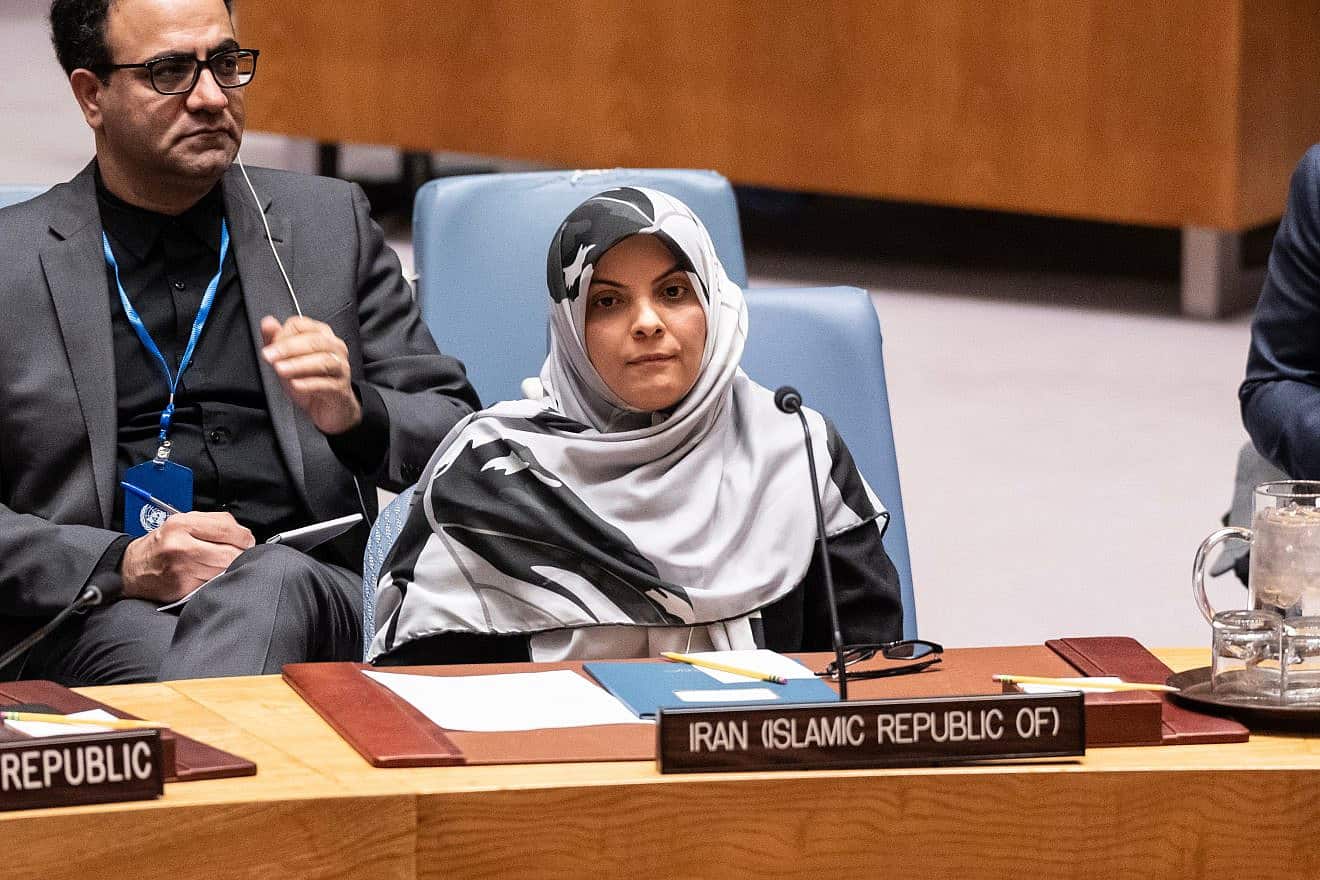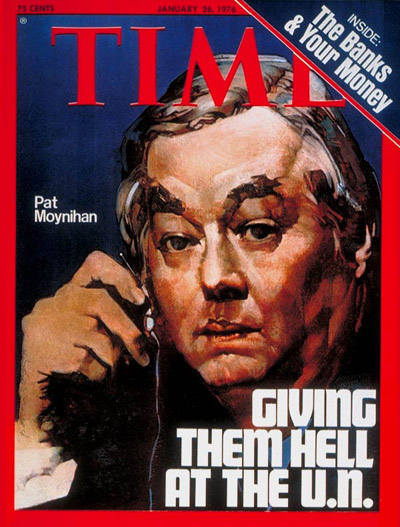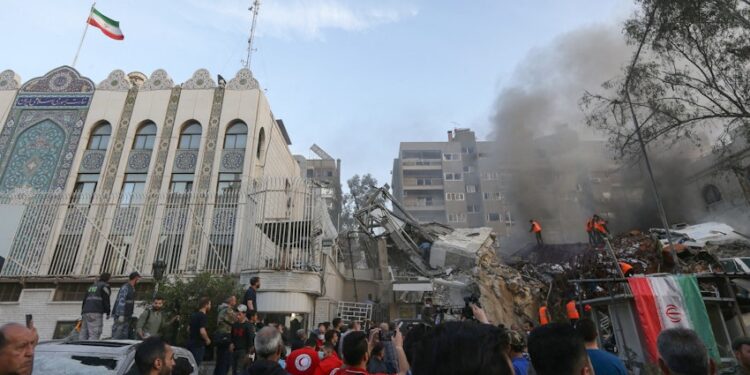by Miceál O’Hurley
TEHRAN — The possibility Israel’s war on Hamas may spill-over in the Middle East had every chance of rising precipitously following Israel’s aerial attack on Iran in the early hours of Friday. Fears of that happening have been belayed by the nature of the attack and the response by both Israel and Iran who each have sought to downplay the incident. Friday’s attack included unconfirmed reports that Iran intercepted 3- Israeli drones over Isfahan. Satellite footage seems to show some damage to what appear to be air defense systems on an Iranian airfield. Isfahan, a centrally located region of Iran, is host to numerous nuclear facilities and was previously targeted by Israel, most notably in 2011, 2020 and 2021.
 Friday’s attack on Iran coincided with the birthday of Iran’s Supreme Leader, Ayatollah Ali Khamenei who turned 85. In Israel, the country is on a defensive alert posture while observing the Passover holiday.
Friday’s attack on Iran coincided with the birthday of Iran’s Supreme Leader, Ayatollah Ali Khamenei who turned 85. In Israel, the country is on a defensive alert posture while observing the Passover holiday.
In Tehran, the regime has gone to lengths to downplay the attack. One spokesperson claimed it to have been a “failed attack” and amounted to “a few quadcopters”. Israel has yet to confirm responsibility for the attack or describe the sortie packages. In the immediate aftermath of the attacks Friday morning Iranian media broadcast images of iconic sights in Isfahan depicting Iranians going about their daily business. The brief closure of airspace of Iran, including the diversion of civil aviation operations, was quickly lifted. There are no reports of damages at the time of publication.
Israel Kicked-Off Latest Cycle of Violence With Attack on Iranian Mission in Damascus
This latest salvo in the escalating attacks between Iran and Israel was expected. The latest bout of belligerent actions began with Israel’s aerial attack on the Islamic Republic of Iran’s diplomatic mission in Damascus, Syria on 1 April. Israel has neither denied nor confirmed their involvement in the strike. The United States and other Israeli allies have publicly indicated their belief that Israel was responsible for the Damascus attack that resulted in the deaths of 7-Iranians and 6-Syrian civilian staff members. Those killed included two high-ranking members of the Iranian Revolutionary Guard Corps (IRGC).
Iran’s Minister for Foreign Affairs, Hossein Amir-Abdollahian, said following the attack, “We consider this aggression to have violated all diplomatic norms and international treaties. Benjamin Netanyahu has completely lost his mental balance due to the successive failures in Gaza and his failure to achieve his Zionist goals.”
Iran waited 12-days before retaliating on 13 April by launching an estimated 330 drones and missiles at Israeli targets. Iran justified their attack claiming their right of self-defense. That attack followed almost 2-weeks of signaling publicly and through diplomatic channels all but the exact time the retaliatory assault would be launched. Tehran’s decision to launch its slowest aerial vehicles first provided Israel with the maximum detection time possible to marshal its defense. Iran fully knew this tactic would result in high intercept rates suggesting damage was not the most significant objective of their response. Iran’s tactics and target packages seemingly indicated its attack was largely for domestic consumption and to promote a prudent deterrence posture. Israel was joined by the United States, Great Britain, France and Jordan in intercepting the aerial vehicles. Israel and its allies claimed a “99% intercept rate” with only 5-strikes being recorded inside Israel. One Israeli child died after having purportedly been struck with debris from one of the intercepts.
That 330-aerial mixed attack vehicles failed to cause significant damage in Israel can only be assessed to have been a desired outcome on the part of Iran. Iran seems to have gone to great lengths to demonstrate its deterrence capability while minimising the potential for significant destruction and death tolls. Hezbollah and other Iranian proxies appear to have not engaged in a coordinated asymmetrical attack. Nonetheless, the attack had all the potential to be deadly but that it was not, combined with Tehran’s claim they considered the matter closed, signals that Iran’s intentions were to confined to ‘face saving’ steps, albeit potentially lethal ones. Any attack carries significant unknowns and inestimable consequences for both Israel and Iran as well as the region and its partners, especially at this time of high tensions owing to the conflict playing-out in Gaza
UNSC Failed to Condemn Israel’s Attack on Iranian Diplomatic Mission
In the aftermath of Israel’s aerial attack on Iran’s diplomatic mission in Damascus the UNSC missed yet another opportunity to demonstrate that even those who are mistrusted and disliked should be afforded the universal principle of the fair application of the law. The failure of the UNSC to condemn Israel’s breach of the 1961 Vienna Convention by its attack on a diplomatic compound in Damascus only invited further flouting of what should be a sacrosanct observation of the law on international relations.

Israel’s supporters have since sought to excuse Israel’s attack on the Iranian diplomatic mission in Damascus pointing to historic, lethal IRGC activities. The 1961 Vienna Convention does not recognise justifications for the breach of the an accredited diplomatic mission and both Iran and Syria claim there to be no legal justification for attacking a diplomatic mission.
The day after the near-total destruction of the Iranian mission in Damascus the UNSC met for a briefing on the attack. According to a statement from the UN Press Office, the 15-member UNSC meeting began with a briefing by Khaled Khiari, Assistant Secretary-General for Middle East, Asia and the Pacific in the Departments of Political and Peacebuilding Affairs and Peace Operations who said, “The rules-based international order is essential for international peace and security, which this Council is mandated to maintain”.
At the meeting Ecuador, a non-Permanent member of the UNSC whose term expires at year’s end 2024, espoused a robust condemnation of the violation of the 1961 Vienna Convention’s prohibition against violating a diplomatic mission. According to a read-out of the 9593RD Meeting (PM), SC/15650, 2 April 2024:
The representative of Ecuador condemned all attacks carried out against diplomatic and consular missions and representatives. Rejecting these acts of violence, regardless of origin, he said that the attack on the Iranian diplomatic premises runs counter to principles enshrined in international law, has cost the lives of civilians and has destroyed civilian infrastructure. “Nothing justifies these types of attacks,” he said, calling on all States to respect the inviolability of diplomatic and consular offices. These acts must be duly investigated and perpetrators brought to justice, he added.
In a demonstration of the gross hypocrisy too often practiced at the UNSC, 3-days following Israel's attack on the Iranian diplomatic mission in Damascus being “enshrined in international law”, after waxing poetic about the principle of inviolability of diplomatic missions, Ecuador outrageously acted sua sponte to breach the 1961 Vienna Convention. Having noted the UN showed no appetite for reproaching Israel for its attack, Ecuador elected to attack the Embassy of Mexico in Quito. In a high-handed raid to assert its political will over the rule of law Ecuadoran police entered the Mexican compound, injuring staff and arrested Jorge Glas who had been enjoying asylum within the mission’s compound.
Contemporaneous Statements made by representatives of all three of Israel’s allies at the meeting reflect mere lip-service being paid to the violation of the 1961 Convention. Each of the 3-Permanent Representatives from Israel’s allies who later took part in intercepting Iran’s aerial attack on Israel on 13 April took turns blaming Iran for its aggressive posture in the Middle East, often carried-out through its proxies, seeking to justifying if not endorsing Israel’s attack on Iran’s diplomatic mission. Each Permanent Representative derided violations of the 1961 Vienna Convention before quickly turning their attention to reminding everyone that Iran’s fingerprints are all over much of the region’s continuing conflicts. The message was clear – the law doesn’t apply to those out-of-favour. The risk of an arbitrary and capricious observance of the law violence has been shown to emerge as an increasingly favourite tool of choice to achieve desired ends by those who feel deprived to the fair and equal application of the law.
A close read of the Statements clearly conveys the concept that some nations espoused the law should not be universal in its scope or application:
Excerpts from UNSC Meeting Read-Out of 2 April 2024: The representative of the United States said that his country had no involvement in the reported strike in Syria, nor did it know about it ahead of time. However, one thing is clear: Iran and its proxy and partner groups need to avoid escalating tensions in the region. Indeed, since the 7 October terrorist attack on Israel, the United States has repeatedly warned Iran not to take advantage of the situation to escalate its longstanding proxy war against Israel and other actors. Iran has ignored that warning. Washington, D.C., does not have confirmation of the status of the building that was struck in Damascus, he said, adding that any confirmed attack on a diplomatic facility would be of concern to the United States. Turning to reports of an Israeli airstrike on the World Central Kitchen Convoy, he said that Israel needs to do much more to protect humanitarian personnel and facilities in Gaza. “It is unacceptable and inexplicable that nearly six months into this conflict, Israeli military deconfliction mechanisms are not functioning appropriately,” he said... “The representative of the United Kingdom underlined the importance of respect for the inviolability of diplomatic premises and protection of diplomatic and consular staff for the proper conduct of diplomatic relations. Iran’s role in destabilizing the region is unacceptable. Among the groups which Iran has continued to support are Hamas, Palestinian Islamic Jihad, Hizbullah, militias in Syria and Iraq and the Houthis. In addition to attacking Israel, these groups have been responsible for the attacks against international shipping, including the deaths of innocent mariners, and attacks against international forces in Iraq and Syria. Iran must cease its support to these groups and use its influence to prevent their attacks. “We are committed to de-escalating tensions in the Middle East,” he said, adding that his country stands ready to work with all members of the Council and the international community”... “The representative of France said that yesterday’s strikes in Damascus have taken place in the context of heightened tensions in Syria and the region. Since the Hamas terrorist attack on 7 October, Iran and its regional partners have born heavy responsibility for this escalation. The international community must do everything possible to ease tensions, he said, calling on all actors to show restraint and prevent regional spillover. Turning to the disturbing situation in the Red Sea, he condemned the destabilizing actions carried out by the Houthis. In Syria, he called for the implementation of resolution 2254 (2015) and voiced regret over the refusal of the Syrian Government to commit to a credible political process”....

It was little surprise that on 19 April yet another Iranian mission, this time the Iranian Consulate in Paris, was subjected to the threat of bomb attack. Police later arrested a person who had threatened to detonate an explosive device he claimed to be carrying inside the Iranian Consulate. No device was found.
Diplomatic missions across the globe have reported reviewing and increasing security in the aftermath of the latest events centred on the Middle East that may have repercussions around the globe. The United States, which sought to downplay the latest breaches of the 1961 Vienna Convention, has significant international exposure to such attacks. According to the US Department of State, they maintain diplomatic missions through 271 bilateral posts (embassies and consulates) in 173 countries as well as 11 permanent missions to international organisations and seven other posts. Only China exceeds the United States in the number of diplomatic missions across the globe.
The decision of the United States, Great Britain, France and others to deflect the UNSC from condemnation of the attack on Iran’s mission in Damascus on 2 April was a mistake. The UNSC repeating that mistake in the aftermath of Ecuador’s raid on the Mexican compound on 5 April was a serious dereliction of its obligations to the international community. The UNSC’s refusal to act on Israel’s and Ecuador’s breaches of the 1961 Vienna Convention has set an alarming precedence for the treaty to be flouted with impunity to the detriment of all nations. As former UN Permanent Representative Daniel Patrick Moynihan once observed, “…whatever is subsidised will only multiply”.
Lack of Fealty to 1961 Vienna Convention Invites Chaos
Moynihan’s observation has been proven correct time-and-again. In the past 50-years, attacks upon diplomatic missions spiked precipitously. The last half-century records 169-reported attacks on diplomatic missions resulting in 334-deaths and 353-injuries to diplomats, consular officials and diplomatic staff. The 1961 Vienna Convention has not seemingly served to deter attacks on diplomatic missions raising the question as to whether it is fit-for-purpose or if lackadaisical efforts to reinforce observance of the law and enact deterrence measures simply invites further violence thus endangering the practice of diplomacy.
The 1961 Vienna Convention has not seemingly served to deter attacks on diplomatic missions raising the question as to whether it is fit-for-purpose or if lackadaisical efforts to reinforce the law and enact deterrence measures simply invites further violence thus endangering the practice of diplomacy.
Evidence indicates attacks on diplomatic missions have not only escalated in numbers in recent years but in lethality as well. The 169-reported attacks on diplomatic missions over the past 50-years stands in sharp contrast to the comparatively small 32-reported attacks upon diplomatic missions occurring between 1923-1973. That period records 32-attacks resulting in 11-deaths and 69-injuries.
While the data cannot be compared exactly for various reasons, including the growth of the number of diplomatic missions across the world and the increased score personnel that serve in them, it is worth noting that it reflects in excess of an astonishing 4-fold increase in the number of attacks alone. Moreover, these figures denote the increasingly deadly nature of attacks on supposedly “inviolate” diplomatic missions. Even modern construction techniques with built-in security considerations incorporated have proven effective in thwarting many attacks.















































